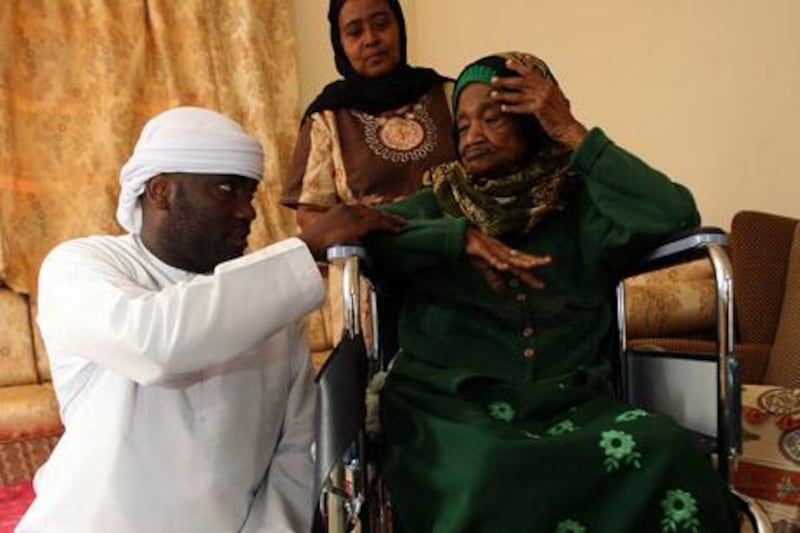RAS AL KHAIMAH // A framed photo at the Ibrahim Bin Hamad Obaidullah Hospital shows a tiny elderly woman surrounded by laughing girls. Salma al Sharhan has earned her place on the wall over the decades.
Known to all as Mama Salma, she was the first Emirati nurse and helped thousands of patients in her 40 years of service. However, the years of toil and travel have taken their toll.
Once a strong, spry woman, Mama Salma, 77, is now deaf and spends most of her days asleep on a mattress on the floor of her home. Her walls are decorated with photos of Mecca and the cupboards are filled with government awards.
While her fame is such that she draws attention at the highest levels of government, she asks for little in return. Dr Hanif Hassan, the Minister of Health, visited Mama Salma last month to ask what the UAE could do to thank her for her years of devoted service.
"She said, 'Nothing'," said her nephew, Salem Esmaeel, 34, who calls his aunt "mama". "I told Dr Hanif I want her only to hear again. I want to listen to her again and I want her family to listen."
Born the daughter of a pearl diver, Mama Salma moved to Bahrain and went to sea with her father and two younger brothers in her teenage years to trade clothing between Bahrain and RAK. She then worked as a cleaner at a RAK pharmacy in the 1950s before joining the hospital about 1961.
Friends and colleagues said a woman known as Nurse Ruth Willis taught Mama Salma the basics of nursing and midwifery. Mama Salma also acted as a translator and travelled with Nurse Ruth to villages around the emirate as part of her duties.
The nature of her work was such that she made some of her rounds on a donkey donated by the Government accompanied by an elderly man toting a rifle. The job and the travel were physically demanding, sometimes too much so. She injured her back so severely while lifting a pregnant woman that the Government sent her to Egypt for three months for treatment.
"People did not like to go to the hospital so mama went to them," said Mr Esmaeel. "If a woman was pregnant and she was about to give birth, mama went. She was very, very tough and very strong."
Her ability to provide creative solutions in dire situations helped spread her legend.
On one occasion she created an incubator from a cardboard box for a premature baby whose mother had died in childbirth. She nurtured him to health with dates and he still visits her on occasion to repay his debt to her.
Though she delivered dozens of babies on the job, Mama Salma had no children of her own. She married a man from Bahrain but they divorced when he ordered her not to work, a demand to which she could not agree. She lived with her mother and when her mother died she was given a room at the hospital, which she preferred to her home.
Mama Salma began to ease into retirement in 2004 as her health deteriorated. She has lived with her Sri Lankan helper, Violet Tisera, since 2000 at a home in Khozam. Though illiterate, she was a professional guide and personal confidante to other nurses. She also held the distinction of being the only Emirati nurse in RAK until the turn of the millennium.
"Sister Salma, she did everything," said Magda Fatthala, a charge nurse who worked with Mama Salma for more than 30 years. "I had studied at the University of Cairo but she was the one with the experience. I had no experience and she was teaching me. That was Mama Salma."
For many years, Mama Salma provided drinking water for the hospital. She donates her salary to charity and supports children she delivered from low-income families.
"Most of her salary she spends on the hospital and on the poor," said Aleyamma John, an Indian nurse who started working with Mama Salma in 1979. "She said, 'Until my death I will get the money from the ministry. Why should I keep it for myself?' I'm like a daughter for her. I am just one of many. She is like this for all of us."
Even though she spent decades in the healthcare field, Mama Salma had her first doctor's appointment last week. It remains to be seen if her hearing can be helped and whether she will accept treatment. "She says, 'God gave this to me, he can take it'," Mr Esmaeel said.
As if she had heard him Mama Salma nodded, pointed to the sky and said, "God is great."
And, at that moment, the call to prayer sounded from the minaret.





